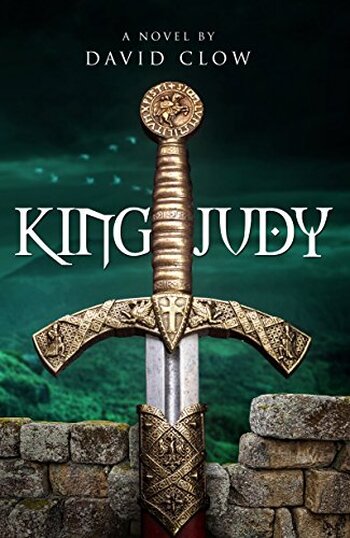 We’ve all heard the tale of King Arthur. How his Knights of the Round Table fought against Morgana le Fey and her army of darkness. Arthur eventually perished, becoming a legend of what chivalry was supposed to look like, how knights were to behave, and the romanticized version of Camelot was born. Now meet Judy Avery: an incredibly young—as in 19 years-old—PhD candidate who has based her dissertation on the fact that the fairy tale has some truth to it. Watch as she presents this dissertation to her own father, who is a scientist to the core, who uses—you guessed it—science to dispel things like Arthur and his Camelot. Judy faces disappointment, is told she needs to rethink her direction, and as a kind of weird joke, is sent to the place where Camelot is meant to be, but is now a cheesy tourist trap. Cue that it’s anything but, and Judy is in for a big surprise. I really love Arthurian fantasy retellings, I love that this was a gender reversal for who is “king”, but I had a hard time connecting to Judy. It could be that I have several very close friends who just passed their dissertations, but I found Judy hard to believe and connect with. Which, I know, is weird when you consider that this is a book about finding Camelot again and its famous knights, who are all alive and thousands of years old, and fighting dragons and gargoyle monsters. She is incredibly young to be a PhD candidate, but that aside, she kind of abandons the research she spent years building when her father—who has made no secret of disapproving myth as fact—doesn’t accept her dissertation. I get she’s disappointed, but she also shouldn’t be surprised. Also she walks away from her passion pretty easily saying it’s all fake, and it’s her adversary in the academic world that tries to bolster her faith back in the Arthur legends? Who full on leans into them well before Judy comes back around? Her enemy-to-friend, Percy, does this big flip, and while I like where he ends (well, kind of, but I won’t say more for spoilers), neither felt as defined as other characters like Lancelot and Morgana. I loved the transition those characters make to becoming theme park owners in order to survive in this new world while maintaining what they can of Camelot. If the PhD thing had been dropped and replaced with a young girl told to give up her childish fantasies I don’t think the core of the story would change at all, it may have even felt a bit more organic, but as it was, I just had the hardest time connecting to Judy.
That being said, I really liked the growth of King Arthur’s sort-of-former knights, and I really liked the creepiness of Morgana’s little beasties. While the first half of the novella was a tad slow, the second half flew by and had such a wonderful, bitter sweet ending. Clow did a great job weaving in the twists and turns, the reveals, and teasing out the secrets the knights had been harboring for such a long time. I mentioned Lancelot was my favorite, right? Good, because he was. I love the tragedy that is his life until Judy comes along, and how pissed that makes him, until he finds himself again. It’s very sweet and well done, which is why it’s so sad I didn’t like Judy more! This was a clever little novella, a fun ride with a unique twist on a tale nearly as old as time. If you like Arthurian Fantasy and enjoy a good gender swap story, I say give this quick, mostly-fast-paced book a try! But given my (and it is a me thing) inability to connect to Judy, and how the narrative voice could be a bit confusing at times given you have 19 year-olds talking to thousand year old men in a kind of omniscient first person narrative, this is a 4 star read for me. But thanks to the author for providing a copy for an honest review!
0 Comments
Leave a Reply. |
Click the book images to see them on Amazon!
Categories
All
|






 RSS Feed
RSS Feed



















